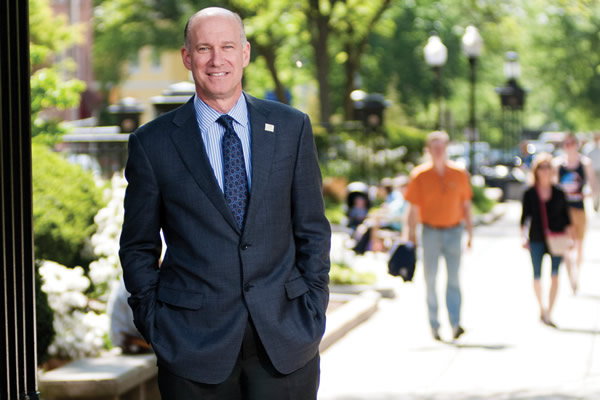Sometimes Events Overtake Us And Must Be Addressed

Last week the graduates of the GW Medical School had the opportunity to hear from my friend and their Dean and I think his speech is something we can all appreciate which is why I am sharing it here.
George Washington Medical School Graduation speech by
Jeffrey S. Akman, MD
Vice President for Health Affairs
Dean, School of Medicine and Health Sciences.
Graduates, what a day to celebrate! We have finally reached the end of … Game of Thrones!
Ok, spoiler alert! I will not win the Game of Thrones and I won’t be sitting on the Iron Throne tonight. As Dean of House Ross and Defender of Himmelfarb this will be the ninth and final time that I have had the honor of leading our MD commencement ceremony. And I couldn’t be prouder than to graduate with the amazing Class of 2019. However, my task is to channel the Game of Thrones protagonist Jon Snow, lead the charge and the recitation of an ancient oath.
All of you in our community inspire me every day with your personal commitment to our historic mission of education, discovery, service and healing. It is a noble mission that I have enthusiastically embraced as I have tried to make this school, my school and [pointing to the students] your school, a better place during my tenure. I also want to thank the love of my life, my partner Steven Mazzola whom the graduates might know as the brains and humor behind my cat Uni’s Instagram posts. Check out #unis_dadsdc. Any successes that I have had in this job would not have been possible without his unwavering support and encouragement.
Before I begin my charge, I want to briefly talk about two issues—the high cost of a medical education and the power of your voice as a GW physician.
When I arrived at GW for medical school in 1977 and during my four decades at GW, the MD program was recognized for being one of the most expensive in the country. We were typically the first, second or third most expensive medical school in the country. That reality had to change. When I was asked to serve in this position, I made affordability and value a key strategic goal and student scholarship support my number one fundraising priority.
While I am the first to admit that medical school is still too expensive and our average student indebtedness is still too high, we have made significant progress. As I like to say, we bent the tuition curve to slow the growth of tuition in relation to other schools and we enhanced scholarship support. When compared to all U.S. medical schools during my tenure as dean, the MD program dropped in total cost of attendance to number 33, total student financial assistance more than doubled moving the school into the top 20 and, incredibly, GW fell nearly 40 spots for average indebtedness among graduating medical students.
Financial indebtedness creates an enormous emotional burden on our students during a time in one’s life and career when the focus should be on one’s medical education and not on where one is going to find affordable food options. One’s choice of medical specialty should not be influenced by one’s debt load. Yet that reality will, unfortunately, still confront the next dean as the expenses associated with medical and higher education continue to rise. Solutions to this national challenge are complex, however, I know that we will continue to engage donors who passionately believe in our mission and, perhaps, are generous enough to help us bring down the cost of tuition or even, one day, make GW medical school tuition free.
But everyone can play a part. Graduates, as you progress through your careers, remember to pay it forward when you can. You are a uniquely altruistic group with exceedingly bright futures. Hopefully you will find yourself making charitable contributions in support of organizations or issues that are important to you and your family. When that time comes remember your graduation day from medical school when the dean made some corny Game of Thrones comments and also asked you to help a future worthy GW medical student. Great universities depend on great philanthropy and on grateful alumni.
Soon after taking on the helm of this medical school I called for a major revision of the MD curriculum to, among other things, integrate the basic and clinical sciences, begin clinical work earlier, reduce the amount of time in lectures and increase the amount of active learning. And, I recruited Dr. Bopper Deyton to lead the creation of our clinical public health curriculum with an effort to take advantage of our unique location in the nation’s capital. Aspiring to our namesake’s legacy as one of the great leaders in world history, I charged our faculty to create a curriculum with the goal of empowering our graduates to become leaders with the capacity to use their voices effectively outside of the hospital and clinic. I wanted our students to have the knowledge, the tools and the confidence to be change agents by gaining an understanding of health policy and learning how to influence policy makers while calling on their extensive medical knowledge and their identity as physicians. I have been greatly impressed by the tremendous results of this effort.
Several months ago, we had the midterm elections. As you may know, the number one issue for the electorate was health care. Yes doctors, the number one issue for Americans is health care! Our patients, our communities and our country need you desperately. And I am incredibly proud and excited that today we are unleashing you as a powerful force to make a difference across our great country and our neighbor to the north, Canada.
As you well know, there is no shortage of health-related issues for you to become passionate about. Despite the truly breathtaking advances in medicine and science, we are in the midst of an unprecedented period of anti-science, anti-health and anti-life forces, much of which is fueled by money, powerful corporate interests, politics and ideology. It is inconceivable that in 2019 we are actually losing ground in many areas related to medicine and health.
Earlier this week I had written my remarks and was going to talk about the exorbitant, unconscionable cost of many life-saving medications: I was going to talk about the dangerous misinformation being spouted about the safety and efficacy of vaccines that is leading to a totally preventable outbreak of serious communicable diseases once thought eliminated; I was going to talk about the disingenuous efforts to destroy the Affordable Care Act thereby denying millions of Americans access to health insurance including over 100 million people with preexisting conditions; I was going to talk about the countless lives lost and the profound medical and public health catastrophes associated with global warming and the resulting devastating hurricanes, floods, fires and droughts; I was going to talk about the failure to address the scourge of gun violence that snuffs out and injures tens of thousands of young lives a year, drenching our emergency rooms and operating rooms in blood and leading to an unacceptable increase in suicide and accidental deaths in the home; And, I was going to talk about the fact that for three years in a row the average lifespan for Americans has declined as deaths from fentanyl and opioid overdoses in urban and rural America escalate to epidemic proportions.
Yes, I was going to talk about these and other medical and health issues confronting us because most Americans want to see solutions for these problems. And most Americans depend on their physicians not only for their medical care but to advocate on their behalf and influence health policy in a patient-centric fashion.
Instead, I had to rewrite my remarks when earlier in the week the Alabama governor signed the most anti-doctor, anti-woman piece of legislation in modern history to effectively ban abortions in the state even in the case of rape and incest. This law muzzles, threatens and jails physicians who provide constitutionally legal reproductive health services and is a profoundly cynical effort to make it harder, if not impossible, for women to get comprehensive health care including access to pregnancy termination.
I read this legislation and it actually criminalizes physicians as Class A felons if they perform an abortion except in the most exceptionally rare situation. In Alabama if a woman is raped and is able to convince a doctor to help her terminate the unwanted pregnancy, the doctor would get a longer prison term than the rapist.
When the supposed pro-life Alabama legislature and the allegedly pro-life governor of Alabama collaborate on this truly shameful law, it leads me to ask several questions. Madam Governor how can you be pro-life when your state has among the highest infant mortality and pregnancy- related deaths in the United States? How can you be pro-life when maternal health indices such as pre-term births and low birth weight rates for newborns are among the worst in the country? How can you be pro-life when your state is number four in the country in the rate of deaths by firearms and no permit is required for the purchase of a handgun? How can you be pro-life when you are intruding into the doctor-patient relationship and will drive physicians out of your state when the need for medical care for your citizens, especially among the large number of socioeconomically disadvantaged Alabamans, is so great?
I understand that abortion is a difficult issue to talk about. And I also understand that probably half of the audience is not pro-choice. But I also know that greater than one in four women in the U.S. will have a pregnancy termination during their lifetime and these women look to their compassionate, skilled and increasingly courageous physicians to help them.
Moreover, I have been in the world of academic medicine for over forty years and I know what drives medical students and physicians—it is the desire, above all else, to help and serve our fellow man. Criminalizing physicians for performing a safe, legal and commonly requested procedure crosses a red line and is fundamentally at odds with who we are and what we stand for.
Graduates, I am not saying that each of you needs to pick up the mantle to support women’s reproductive rights, however, I am encouraging to find an issue that you are passionate about and, with your white coat, grab it and run with it.
As you proceed to the next phase of your career you might think that as a resident your voice won’t make a difference or that you might not have the time to get involved. That is certainly a possibility, but it shouldn’t be an excuse.
So, I have some advice. Join your medical specialty organization or society. If you are going into surgery, follow the lead of our keynote speaker Dr. Barbara Bass and join the American College of Surgeons. If you are going into internal medicine, join the American College of Physicians. If you are going into psychiatry, join me as a member of the American Psychiatric Association. And if you are going into ob/gyn, join the American College of Obstetrics and Gynecology.
Every specialty and subspecialty in medicine have organizations that are speaking to the issues that are relevant to that specialty and to our patients. Pull up their websites and read the position papers of our specialty organizations and you will see positions on gun violence, vaccines, family separations, health disparities, climate change, women’s reproductive health, access to affordable health care and prescriptions, veteran’s health and more.
As a busy resident, it might be the easiest way to make your voice heard—and better yet, your voice will be amplified. I know that your generation might not like joining things, but I strongly encourage you to do it. Americans believe that health care is the number one issue facing our country and you, as a GW physician have the power to do something about it.
Now, for those of you who are Game of Throne fans, you know that oaths and the challenges associated with keeping oaths as they relate to duty, honor, love and family have been important themes in the show. Perhaps the most famous oath in the show and the dilemma of keeping his oath belonged to Jon Snow who recited the oath for becoming a Commander of the Night's Watch. Brienne of Tarth’s oath was to protect Sansa Stark and her sword was named Oathkeeper.
And so, you too are meant to become oath keepers.
Doctors, your path on the road to physician hood began with an emphasis on professionalism and humanism, with the white coat as a symbol of both. At your White Coat Ceremony, you recited our school’s oath and signed our honor code. Now with the recitation of the Hippocratic oath, we come full circle. We conclude your journey in medical school and embark on the next chapter in your professional lives by reinforcing these same values and qualities.
The Oath of Hippocrates is the most enduring tradition in western medicine and has been the guiding ethical code for physicians since ancient Greece.
It covers important ethical issues between doctors and patients and serves as a contract for doctors to work towards the benefit of the health of the public. It emphasizes the physician’s responsibility to guard against abuse or corruption of his or her knowledge and art and requires the physician to treat the sick to the best of one’s ability.
Today we complete your George Washington medical school experience with the powerful reminder that ethical behavior, professionalism, service to our fellow man, and the courage to live these values are, and have been, at the core of the GW physician identity. And so, doctors, I charge you to always put patients first and conduct your lives with integrity. When you signed your medical school’s honor code four years ago it was a pledge for life. Sustain your call to service and advocacy that brought you to George Washington for medical school. There is so much that needs to be done in our communities, in our country, and around the world. Strive to be the physician-citizen, the physician-officer or the physician-activist that will make an impact beyond the exam room. Maintain the highest standards of professionalism. Practice civility. Never mistreat a medical student, resident, nurse, or colleague in the context of learning. Do not model behavior that you know fails to meet the standards of what is right and wrong. Be a physician of high moral character.
Doctors wash your hands. Especially when you are incredibly busy residents, foam in and foam out with every patient. Sit down when you enter your patient’s room and take the time to introduce yourself. Model these behaviors for your medical students (and your attendings). Leadership in quality health care is in the doing of it and each of you must become leaders in patient-centered quality care and patient safety.
Doctors take care of yourselves. Maintain the passion that you have for medicine but take time for yourself and with your families and friends. Don’t let the electronic medical record get you down. Stay active. Live a healthy lifestyle and, importantly, reach out for help if necessary.
*/
And fellow alumni, stay engaged with your alma mater. We want to know how you are doing and we want to take pride in your accomplishments. We want to stay involved with you.





